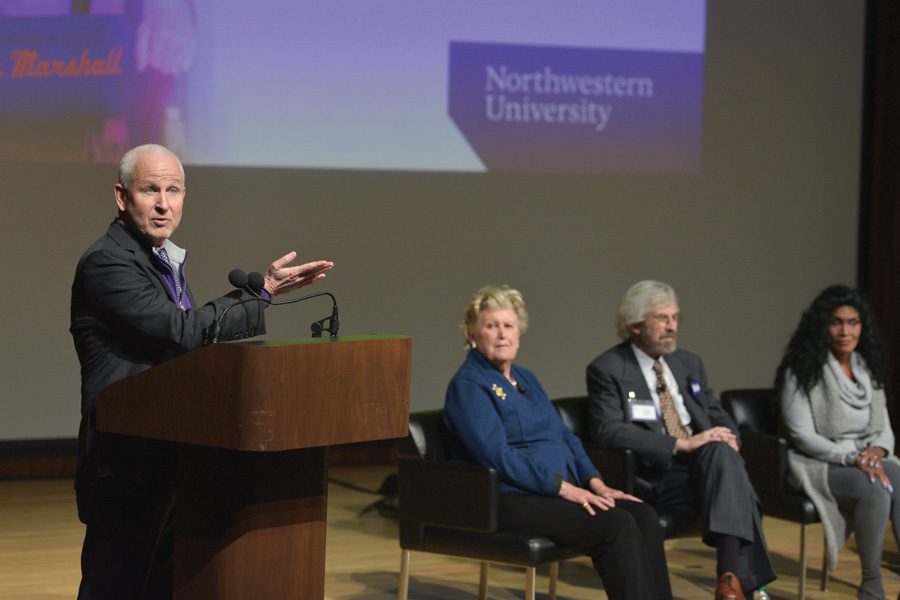Alumni panel touches on progress in racial, gender equality in Northwestern history
Lauren Duquette/Daily Senior Staffer
University President Morton Schapiro speaks at a panel Friday. Five Northwestern alumni spoke at the panel, and some of them discussed progress in racial and gender equality at the University.
October 23, 2016
During a panel moderated by University President Morton Schapiro, Isola Jones (Bienen ‘71) reflected on a “major influx” of black students enrolling at Northwestern during her freshman year.
“That same year, the first African-American homecoming queen was from our campus,” she said. “This made national news, and I was just so proud of the university.”
Jones, former mezzo-soprano at the Metropolitan Opera in New York, is the only African-American artist to have sung more than 500 performances with the opera.
She was joined at the homecoming panel, held Friday in Norris University Center, by four other alumni: Linn Hobbs (McCormick ‘66), a professor of materials science and nuclear engineering at Massachusetts Institute of Technology; Samir Mayekar (Weinberg ‘06, Kellogg ‘13), co-founder and CEO of SiNode Systems; Phyllis Elliott Oakley (Weinberg ‘56), an foreign service officer at the State Department; and Dave Revsine (Weinberg ‘91), the lead host for the Big Ten Network’s coverage of men’s football and basketball.
Some of the panelists discussed the increase in enrollment of female students at NU over the past decades.
This year, Jones said the United States is “on the verge of doing something spectacular” for women. Whereas countries such as India, Israel and Germany have had female leaders, the United States has not yet had a female president, and Jones said electing Hillary Clinton for president would be “good for everyone.”
Schapiro said NU was ahead of many other colleges in admitting women. The university’s first co-ed graduating class was 1874, whereas Williams College — where Schapiro served as president from 2000 to 2009 — didn’t have a co-ed graduating class until 1975. At Yale and Princeton, the first groups of women to spend four years at the universities graduated in 1973.
Oakley agreed NU was open academically to men and women in the 50s, but said things were different outside the classroom. For example, the class president was always a man, she said.
“The president of the student governing board … was a man,” Oakley said. “I could be the vice president. That was just the way it was.”
After graduating from NU, Oakley went on to become the first female deputy spokesperson at the State Department during George Shultz’s term as Secretary of State.
Panelists also described finding community on campus and said the university provided them an abundance of opportunities to pursue their interests.
“No matter who you are, no matter what intrigues you, there is a place here for you,” Revsine said.
Mayekar, who was the national security director at the White House during President Barack Obama’s first term, said NU was his foundation in the United States, as his family immigrated from India.
“When you come from immigrants, you just don’t have a big network in this country, and so Northwestern really helped give me my place,” Mayekar said.
Schapiro said he wishes Garry Marshall (Medill ‘56) could have spoken on the panel. Marshall, director of blockbuster film “Pretty Woman” and a life trustee of NU, died in July. He was 81.
Barbara Marshall, Garry’s wife, attended the panel, which included a photo slideshow and video to honor the late director.
“If you could ever think of a more purple person than Garry — every one of his movies, someone has an NU sweatshirt,” Schapiro said. “He was just an extraordinary person.”
Email: peterkotecki2018@u.northwestern.edu
Twitter: @peterkotecki


